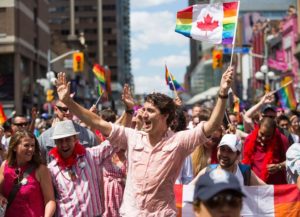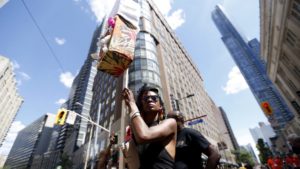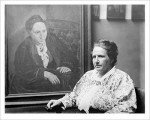Toronto Pride Meets Black Lives Matter
I’ve obviously got too much time on my hands. How else to explain my spending two hours on Facebook the other evening (until it was way past my bedtime) having an argument about racism in Canada compared to racism in the United States? Part of it, I think, must have been because I was grumpy about being stuck in the middle of writing an essay tentatively titled “Toronto Pride Meets Black Lives Matter.” When I’m stuck in the middle of an essay, I sometimes turn on Facebook or play some mindless computer game in order to let my subconscious “think” (or whatever my subconscious does).

PM Justin Trudeau at Toronto pride parade.
My half-written essay was inspired by the Toronto gay pride parade on July 3, 2016. That’s the massive annual march where for the first time, a sitting Canadian prime minister, Justin Trudeau, participated in the event (and did so, it should be noted, with considerable “sunny ways” enthusiasm). It’s also the pride parade where the invited honoured guests, the group Black Lives Matter (BLM), decided to stage a sit-in protest, which halted the parade for about 25 minutes until the parade organizer agreed to accept all of BLM’s list of “demands,” including one that would ban the local Toronto police force from having a float in the parade. The next day, the pride organizer pointed out that he accepted the demands simply to get the parade moving again, and that, anyway, he didn’t have the authority to make decisions about acceding to the BLM demands, but would bring the issue to the pride-powers-that-be, namely the “LGBT community.”
Naturally, all this created a kafuffle, mainly in the media, but also in “life.” In the spirit of “no good deed should go unpunished,” the first target was the prime minister. Several social media devotees grudgingly allowed that Trudeau’s marching and dancing and merrymaking in the parade was all well and good, but what about his policy on selling military hardware to the evil Saudis, and what about his pipeline policy, and what about his support of free trade dirty deals, and a whole bunch of other but-what-abouts? This is what my journalist pal Tom Hawthorn (who mostly writes obituaries for the Globe and Mail) calls “But-what-about-ism.”
No, the fact that Trudeau did a good thing which ought to be encouraged is just not good enough, and long lists must be produced pointing out to the ignorant citizenry all the bad things the prime minister has done or is thinking of doing once the “honeymoon” phase of his relationship to the Canadian public is over. Further, but-what-about-ism reminds me of when I was a child in Vancouver writing for a socialist newspaper, and the “stylesheet” of the paper seemed to require that in every teensy article in which we reported a noble workers’ strike or a glorious proletarian cultural event we also had to deliver a little sermon on the need for socialist revolution in Canada. Gee, can’t remember how old of a child I was at the time – 4? or 34? Similarly, every good deed by the PM must be accompanied by a reminder of his record or possible record of malfeasance in office No, we just can’t cut “sunny ways” Justin a little slack (although we often offer the Other Justin – the Bieber – plenty of empathy and adoration, even when he’s behaving badly, like pissing in a bucket).

Black Lives Matter marchers at Toronto pride parade.
The major kafuffle arising from the pride parade was, of course, about black activists behaving badly. How dare those BLM anti-racist campaigners throw a spanner into a major Toronto tourist event (complete with corporate and other institutional sponsorship – and er, uh, those gay and lesbian and transgender cops)? In no time flat, Globe columnist Margaret Wente and various others (including some parade participants) were denouncing BLM for the sit-in protest, and for “bullying,” and “hijacking” this quasi-commercial, quasi-political civic occasion, as well as issuing scorecards on BLM’s annoying tactics.
Now, you don’t have to like BLM (or even press the “like” button on Facebook on their behalf), but my response to their sit-in was that it was only a 25-minute or so disruption, they got to make their apparently much-needed point that there’s racism in both Canada and the LGBT community, that the several hundred thousand viewers and the pride parade could easily manage the slight delay, and finally, speaking in the terms invented by Canadian media expert Marshall McLuhan and French philosopher Jean Baudrillard, the kafuffle got the “pride issue” a lot more media and other attention than it would have achieved through a more demure version of the parade. I.e., I think we can live with it. It’s not the end of the world.
And anyway, young, self-righteous, morally superior protesters are always annoying to old people like us — we who were not the least bit annoying when we were young protesters. (“Whaddaya mean I’m ‘putting a gun’ to your head,” I said to the head of the French department when he objected to us students breaking in to the Academic Senate meeting at university. “I don’t have any gun, ya see any gun in my hand?” I insisted. How old of a child was I then?)
The following week, it was indeed the end of the world for two young black men who were killed by police officers in Baton Rouge, Louisiana, and St. Paul, Minnesota, police officers who clearly used brutal and excessive force in dealing with blameless (or mostly blameless) black U.S. citizens, as demonstrated by the by-now inevitable smartphone-recorded video evidence. The killings (the latest in a very long string of senseless murders of black people by the police) were followed the next day by the equally horrible killing of five police officers in Dallas, Texas by a black, former U.S. military member sniper armed with a semi-automatic assault rifle. The police were on duty, monitoring (or protecting) a non-violent BLM protest march in the streets of the state’s largest metropolitan centre. If nothing else, the bloodtide of subsequent events certainly shrinks the Toronto pride parade kafuffle to a perspective more appropriate to its actual footnote size in history.
While I was figuring out the moral of the story, which is that the great shame of America is its historic and current treatment of black people, and those practices ought to be changed, deeply changed… if only President Barack Obama and his successors can get the American police, the Republican Party, and the National Rifle Association to minimally cooperate on common sense gun laws and practices of equality and mutual respect (an unlikely prospect at the moment). Even though I’m not really good at believing in conspiracy theories I now almost believe that the agenda of the NRA and segments of the Republican Party is to prepare for citizen war against the elected government of the United States.
Anyway, while I was stuck in the middle of these troubling thoughts and my troubled essay, I clicked on Facebook. It all started with the posting of an article by my FB “friend” Peter B. (I’ll be referring to FB interlocutors with their first name and last initial to afford them some of the privacy they can’t get from FB itself). The piece was from a minorstream media source, Vice, and was about a black man in Bathurst, New Brunswick, who had been parked down by the pier reading a book, and who subsequently got stopped by the police on his way home because someone had called in a suspicious-black-man-reading-at-the-pier complaint. In case you’re biblio-curious, he was reading a book by C.S. Lewis, the religious thinker and speculative-fiction author of the Chronicles of Narnia series. (Amil Niazi, “Meanwhile in Canada: Black Man Stopped by Police for Reading,” Vice, July 11, 2016).
The New Brunswick man was promptly undetained and didn’t appear disproportionately outraged by the racist incident, but the point of the piece and my friend Peter B. posting it was to debunk the idea that some Canadians have that “at least we don’t have that kind of racism here in Canada.” The article writer underscores the idea “but we absolutely do have ‘that kind’ of racism here in Canada. Our much celebrated melting pot of diversity makes for great political sound bites and subway poster campaigns, but the day to day reality for many people of colour is closer to this New Brunswick man’s recent experience.” Clearly, in the article, “that kind” of racism refers to the kind they have in the U.S., which results in the regular shooting deaths of young black men by trigger-happy cops.
I objected to Peter B. that there’s a non-smug sense in which we don’t have that kind of racism here. We of course have racism (and more) in Canada, but not exactly that kind. Are you really going to claim an equivalence between the New Brunswick incident and that week’s shooting deaths in the U.S.? I asked. “Gosh, you must be really desperate to prove that we Canadians are as bad, racist and gun-crazy as our neighbours to the south? GLWT.” (GLWT is the acronym for Good Luck With That.)
Peter B. replied, “The comparison is yours not mine.” The post, he pointed out, “is about Canadian smugness and denial of racism.” And he then referred me to another article about Canadian racism from Toronto Life.
I wasn’t satisfied. It seemed obvious to me that the attempted comparison between U.S. lethal racism and the “merely” deeply offensive Canadian version was obvious, and not quite right. This wasn’t merely “about Canadian smugness and denial of racism.” I rejoined, “There’s a racism issue in Canada (and BLM’s intervention at the Toronto Pride parade is an effort to identify it), but I don’t think exaggerating the problem helps to get people to think about how to solve it.” I also don’t think our masochistic Canadian tendency to think that we’re worse, more evil, more racist-sexist-homophobic-etc. than anyone else helps to solve the problem either. What helps is to face up to the problem and to do something about it, whether the “something” is national in scope, like creating a royal commission and acting on its recommendations, or individual, like actually listening to a person who’s been subjected to racism and responding to their complaints with empathy and solidarity.
I probably should point out (as I did on FB) that about 98 per cent of the people in Peter B.’s FB network (excepting his cranky Uncle Max in Moosejaw) and 98 per cent of the people reading our exchange “are progressive, leftist, anti-racist, political veterans who don’t need to be persuaded that there’s racism in Canada. This thread is not being read by right-wing, mouth-breathing, wingnuts living in the depths of the Fraser Valley in British Columbia.” (I hasten to add that I apologize for offending the sensibilities of decent Fraser Valley-dwelling inhabitants. Given the price of housing in Vancouver these days, Fraser Valley is about as close as one can get to the heart of Lotusland.) More seriously, my question was, “So, what are we trying to tell each other?” That is, aren’t we kind of preaching to the converted and might not our energies be better used trying to persuade the dwellers of trailer-park jungles along the mighty Fraser River to share our views?
By now, various other people had entered the conversation or the thread or whatever you call these FB arguments. Patrick K. began, “As a black person in Canada…” and Miranda H. said, “Please – you want to talk about racial injustice in Canada created by the police, let’s open this up a little more broadly…” and what followed was a lengthy recounting of the experiences of aboriginal Canadians. I tried to defend the notion that there were significant historical, political and cultural differences between Canada and the U.S. Alas, I resorted to sarcasm in an effort to loosen up any impending self-righteousness. “Well, speaking as a transgendered, aboriginal, person of colour, Sephardic Jew, and victim of ageism caused by people in your age group, if you don’t think there’s a serious difference between Canada and the U.S. …”
It didn’t work. Miranda objected to my “making comments with regards to my generation – and you have no idea what generation I’m in, having wronged you…” Actually, I did have a vague idea, having looked at Miranda’s photograph on her FB home page. But no, my attempts at humour were utterly wasted. Some days I think that most people have the sense of humour of a tortoise.
But let’s cut to the chase. Are there significant differences between social practices in Canada and the U.S. and is it worthwhile acknowledging those differences? “Quite frankly,” said Miranda, “the main difference that I see between Canada and the US on these matters is gun laws. There are areas where the racism that we deal with in this country are far more subtle, which has also been reasonably argued as being far more problematic than overt racism – especially in the area of actually doing anything about it…”
“Miranda, this may surprise you,” I said, “but I actually prefer subtle racism-sexism-homophobia-ageism to the overt kind where you get lynched, gaybashed, called names, and slaughtered in old age homes. Over the last several decades, I think we activists have been reasonably successful in getting the haters not only not to kill us but to just shut up.” I was going to use the British phrase, “just shut the fook up,” but I refrained. “On Canada-U.S. differences,” I went on (and on), “you have to take into account not only gun law differences but the history, culture, and politics of a society that accepts such restrictions on the use of guns. These… differences also account for other policy differences between Canada and the U.S., such as universal health care, general civility, early adoption of same-sex marriage laws” and all the rest. I apologized for unsuccessfully attempting to appeal to her sense of humour. As the great stand-up comedian Samuel Beckett famously observed, “Failed jokes. Missed punchlines. Fail again. Fail with better jokes.”
Well, if that wouldn’t persuade Miranda, nothing would. Nothing would, as it turned out. Instead she cited former Canadian prime minister Stephen Harper’s attempt to stir up racism in the 2o15 federal election by referring to Muslim women wearing hijabs and niqabs. Rather than observing that Harper was defeated in a majority landslide by Justin Trudeau, she said, “And look at how close Harper came to winning based on the hijab. Ultimately, yay – that issue was shot down by the majority here… but not by much, and that’s a problem.” Some people just can’t handle good news. Every time the bus or the subway turns up on time I fall into raptures of praise for the State, and Canadian “peace, order and good government,” compared to the fickle American “pursuit of happiness.” Not good enough. “We’re the land,” said Miranda, “that Hitler praised for the residential school practices and that Apartheid decided to mimic…” Whoops, right off the deep end.
Well, there’s lots more. But it was midnight and way past the bedtimes of toddlers and totterers. And there were lots of other people. I haven’t even mentioned Frank F., a 68-year-old, four-decade teaching veteran, retired professor of Black Studies, who began his mild-mannered, judicious observations by saying, “Some people are so blind they want to believe not having said ‘Nigger’ all day means that they aren’t racist…” I tried to get him off racism for a nano-second and persuade him there was a small but important difference between countries (like Canada) where you can have pride parades, same-sex couples getting married, and lesbians and gays serving in the military, compared to places (like the Islamic State – which is neither Islamic nor a state) where gays are tossed off tall buildings for being gay. A difference. A measurable difference that matters. Yes? Nope, no luck.
Nor was Miranda to be placated. “If you want to talk about what the conversation is actually about, it’s about you shutting down a conversation on racism in Canada, especially in light of what’s happening in the States.” While she was prepared to allow that “we’re likely all progressives on Peter B.’s page, I would hope that we’re not all apologists.” Ouch. I noted that it was past my bedtime and in the spirit of truth-seeker journalist Edward R. Murrow, I wished her, “Good Night and Good Luck.” She wished me “faites de beaux reves.” Google offered to translate this for me, but I knew it had something to do with having sweet dreams. Comment le Canadien! I thought, as we concluded with characteristic Canadian bi-lingual politeness. Only in Canada? as one tea company slogan used to ask, adding, Pity.
.
Berlin, July 12, 2016.


